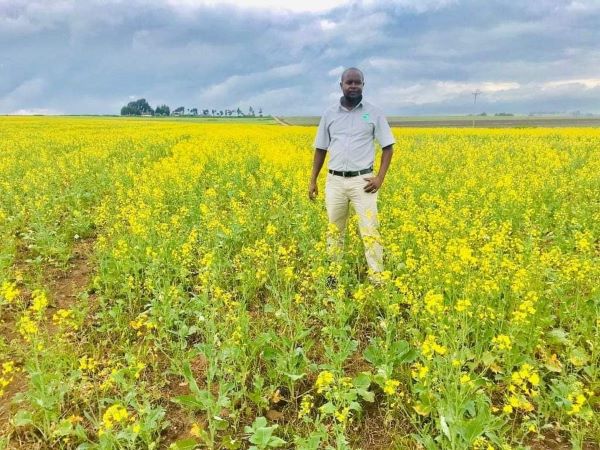Small-scale canola farmers in Kenya are set to enjoy global prices for their canola seeds after entering into contract farming with a local oil processor.
According to Don White, CEO at Agventure Ltd, the Kenyan-based canola oil processor and producer of a range of wholesome food products, the farmers will receive Ksh75 per kilo of canola seeds they deliver.
The pay is most times dependent on the prices of canola seeds in the global market. “The prices change monthly as per the dictates of the global market,” said White.
Before, the farmers have been earning an average of Ksh40 per kilo of canola seeds also known as rapeseeds sold to individual local buyers popularly known as brokers.
In the contract, farmers will also benefit agronomical training on the production of the crop to not only ensure that farmers retain the health of their soil through minimal tillage of their farms but also sustained supply of quality raw materials at the company’s processing plant.
Raw material headache
With an annual production of 8,000 tonnes of canola oil, the company supplies locally and exports to Uganda but limited raw materials (rapeseeds) has been a headache that the contact farming plan is seeking to sort out.
In this, Agventure has contracted farmers from areas such as Laikipia, Nyeri, Meru, Nakuru, Uasin Gishu, and Isiolo counties.
For farmers to be signed up, they together need to team up and put up at least 30 acres under canola. This is to ensure the small-scale farmers meet the required acreage.
The plan also leverages the economies of scale while creating markets for the produce.
Mitigating diseases
To help the growers prevent diseases attacking the high-value crop, the company encourages farmers to employ crop rotation as a mechanism to mitigate diseases that invade the cereals and also interrupts the pest cycle.
“We have been advocating for crop rotation or sustainable agriculture to maintain the health of the soil and consequently increase farmers’ yields and a better income for the farmers,” said John Mwiki, Agventure Limited agronomist.
Canola oil is the flagship product for the company but they have expanded their products to three types of honey – wildflower honey, sunflower, and rosemary.
Besides virgin canola oil, they also manufacture canola oil that is infused with herbs such as rosemary and pepper.
The company also produces pulses such as Lupin, green and white peas, and chickpeas.
Geoffrey Kangethe, who is one of the contracted growers, says that before canola, he planted wheat and barley on his 50-acre farm.
Through crop rotation, he has managed to increase his yields and his income as well as enrich the soil on his farm. On the farm, he harvests at least 15 to 16 ninety-kilogramme bags of canola.
Competition
Agventure Limited faces stiff competition from other local canola oil processors who are also working to contract farmers to supply their plants.
One is Upfield, a Netherlands plant-based that is sourcing the seeds from 3,400 accredited small-scale farmers in the Mt. Kenya Region.
Another is Kieni Canola Oil started by Kenyan agro-entrepreneur David Kimondo Waiganjo in 2007 and which has been training farmers within Agricultural Training Centres (ATC) or Agricultural Technology Developments Centres (ATDC) or Agricultural Mechanization Centres (AMC) in Nairobi, Kisumu, Kisii, Mombasa, Eldoret and Machakos
Canola seeds mature in three months and are harvested when the seeds have a moisture content of about 35 per cent. The yield ranges from 750 – 1500kgs per acre translating to three to six tonnes per year per acre.








